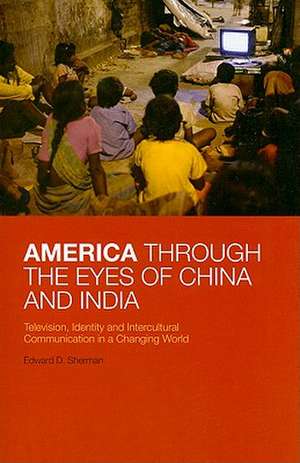America Through the Eyes of China and India: Television, Identity, and Intercultural Communication in a Changing World
Autor PhD Edward D. Shermanen Limba Engleză Paperback – 10 noi 2010
| Toate formatele și edițiile | Preț | Express |
|---|---|---|
| Paperback (1) | 189.80 lei 6-8 săpt. | |
| Bloomsbury Publishing – 10 noi 2010 | 189.80 lei 6-8 săpt. | |
| Hardback (1) | 565.94 lei 6-8 săpt. | |
| Bloomsbury Publishing – 10 noi 2010 | 565.94 lei 6-8 săpt. |
Preț: 189.80 lei
Preț vechi: 221.61 lei
-14% Nou
Puncte Express: 285
Preț estimativ în valută:
36.32€ • 39.44$ • 30.51£
36.32€ • 39.44$ • 30.51£
Carte tipărită la comandă
Livrare economică 22 aprilie-06 mai
Preluare comenzi: 021 569.72.76
Specificații
ISBN-13: 9780826430922
ISBN-10: 0826430929
Pagini: 184
Dimensiuni: 138 x 216 x 15 mm
Greutate: 0.26 kg
Editura: Bloomsbury Publishing
Colecția Continuum
Locul publicării:New York, United States
ISBN-10: 0826430929
Pagini: 184
Dimensiuni: 138 x 216 x 15 mm
Greutate: 0.26 kg
Editura: Bloomsbury Publishing
Colecția Continuum
Locul publicării:New York, United States
Caracteristici
This book will provide a better understanding of television in the global world, the relationship between media and identity, a sense of the culture of India and China, as well as an awareness of the communicative possibilities opened by global media.
Cuprins
Introduction Scene #1: IndiaChapter 1: Globalization, Culture, and Identity: Oh my! Exercise #1We are the World Getting Cultured The Oracle at Delphi Chapter 2: Watching TV is good for You Exercise #2Watch what you are Doing Keeping it Real 3-2-1 Contact Not so Secret Code Speaking in Many Voices Drink the Kool Aid Getting to Know you, Getting to know all about YouChapter 3: A Slow Boat to China Exercise #3Ni Hao Confucius Says Act without Acting Rub my Belly The Little Red (section of this) BookChapter 4: (Not) Watching TV in ChinaThank you for watching Chinese Central Television Breaking the Law Mind numbing Goodness Friends Prison Break LostChapter 5: A Passage to India Exercise #4(Dis)orientation This God is your God, this God is my God, From Varanasi to the Bay of Bengal A Moment with the Mahatma Thank you for Calling Bangalore, err... I mean AOLChapter 6: Watching TV in IndiaHey you can Watch TV on TV Here You will obey Rupert Murdoch More Mind numbing Goodness The Simpsons Heores The OCChapter 7: This is America Exercise #5 America the Beautiful Of Saints And Sinners Through the Eyes of Another Globalization Redux Come together right now over MeChapter 8: Ignore your Mother, Talk to Strangers Exercise #6 Can We Talk? Mission Control: We have Contact I am right. No, I am right. No, no, I am right, No, no, no I am right... I'd Like to Teach the World to Sing in perfect Harmony We Need to Talk In Praise of Misunderstanding Let's get Together The Glowing MessiahConclusion Scene #2: China
Recenzii
This book is a stimulating, fast-paced look at the way 'others'-in this case the two looming Asian superpowers, China and India-look at 'us', via the lens of television. Through a discussion of Chinese and Indian interpretations of popular shows such as Friends, Lost, and The Simpsons, Dr. Sherman sheds new light on a heady mix of glamor, glory, dislocation and malaise that characterizes US and global media culture in the early twenty-first century. Part travelogue, part academic analysis, topped off with unrelenting black humor, America through the Eyes of India and China is sure to engage anyone interested in intercultural relations and (mis-)communication. -- James Mark Shields, Assistant Professor of Comparative Humanities and Asian Thought, Bucknell University
Simultaneously serious and humorous, Sherman's book offers valuable lessons on culture, identity, and what it means to be American in a world in which pluralism continues to be important despite globalization. -- Robert Paul Churchill, Professor of Philosophy, George Washington University
Simultaneously serious and humorous, Sherman's book offers valuable lessons on culture, identity, and what it means to be American in a world in which pluralism continues to be important despite globalization. -- Robert Paul Churchill, Professor of Philosophy, George Washington University
